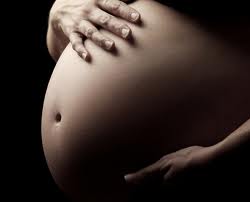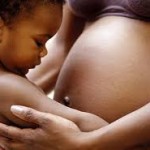Some women don’t have any pregnancy symptoms for weeks and may only realise they could be pregnant when they start to have some of the following pregnancy symptoms. Generally the first signs of pregnancy (sore breasts, feeling a bit irritable) are easy to confuse with PMT or an impending period.

Missed period : Missing a period is the clearest sign for many women that they could be pregnant. But there are causes other than pregnancy for your period not arriving on time, such as stress, being too thin, taking certain medicines, eg the Pill, and breastfeeding.
Implantation cramps and bleeding : Another symptom some women have is poking feelings in their abdomen, or slight bleeding. This is implantation cramping and bleeding caused by the egg burrowing into the womb lining.
Other pregnancy symptoms : For some women none of the above applies and their first pregnancy ‘symptom’ may be that they just feel unwell, as if they’re coming down with a virus or bug. Other women feel lightheaded or dizzy, while some get headaches.
Spotting and Cramping : A few days after conception, the fertilized egg attaches itself to wall of the uterus. This can cause one of the earliest signs of pregnancy — spotting and, sometimes, cramping. That’s called implantation bleeding. It occurs anywhere from six to 12 days after the egg is fertilized. The cramps resemble menstrual cramps, so some women mistake them and the bleeding for the start of their period. The bleeding and cramps, however, are slight.
Besides bleeding, a woman may notice a white, milky discharge from her vagina. That’s related to the thickening of the vagina’s walls, which starts almost immediately after conception. The increased growth of cells lining the vagina causes the discharge.
This discharge, which can continue throughout pregnancy, is typically harmless and doesn’t require treatment. But if there is a bad smell related to the discharge or a burning and itching sensation, tell your doctor so they can check on whether you have a yeast or bacterial infection.
Breast Changes : Breast changes are another very early sign of pregnancy. A woman’s hormone levels rapidly change after conception. Because of the changes, her breasts may become swollen, sore, or tingly a week or two later. Or they may feel heavier or fuller or feel tender to the touch. The area around the nipples, called the areola, may also darken.
Other things could cause breast changes. But if the changes are an early symptom of pregnancy, keep in mind that it is going to take several weeks to get used to the new levels of hormones. But when it does, breast pain should ease up.
Fatigue : Feeling very tired is normal in pregnancy, starting early on. A woman can start feeling unusually fatigued as soon as one week after conceiving. Why? It’s often related to a high level of a hormone called progesterone, although other things — such as lower levels of blood sugar, lower blood pressure, and a boost in blood production — can all contribute.
If fatigue is related to pregnancy, it’s important to get plenty of rest. Eating foods that are rich in protein and iron can help offset it.
Nausea (Morning Sickness) : Morning sickness is a famous symptom of pregnancy. But not every pregnant woman gets it (I know of a pregnant woman who had evening sickness). Here’s why it happens. A pregnant woman’s hormone levels can slow the emptying of her stomach. That contributes to nausea, often called morning sickness, though it can happen at any time during the day. Also, some women crave, or can’t stand, certain foods when they become pregnant. That’s also related to hormonal changes. The effect can be so strong that even the thought of what used to be a favorite food can turn a pregnant woman’s stomach.
It’s possible that the nausea, cravings, and food aversions can last for the entire pregnancy. Fortunately, the symptoms lessen for many women at about the 13th or 14th week of their pregnancy.
In the meantime, be sure to eat a healthy diet so that you and your developing baby get essential nutrients. You can talk to your doctor for advice on that.
Other Early Symptoms of Pregnancy
- Frequent urination. For many women, this starts around the sixth or eighth week after conception and it’s most likely due to hormonal levels.
- Constipation. During pregnancy, higher levels of the hormone progesterone can make you constipated. Progesterone causes food to pass more slowly through your intestines. To ease the problem, drink plenty of water, exercise, and eat plenty of high-fiber foods.
- Mood swings. These are common, especially during the first trimester. These are also related to changes in hormones.
- Headaches and back pain. Many pregnant women report frequent mild headaches, and others experience chronic back pain.
- Dizziness and fainting. These may be related to dilating blood vessels, lower blood pressure, and lower blood sugar.
- A heightened sense of smell eg to cigarette smoke or cooking
- Feeling emotional and crying more easily than usual
- Metallic taste in the mouth (which could also last all through the pregnancy)
A pregnant woman could have all of these symptoms, or maybe have only one or two. If any of these symptoms become bothersome, talk with your doctor about them so you can make a plan to offset them.
Sources: Mumsnet, Webmd


